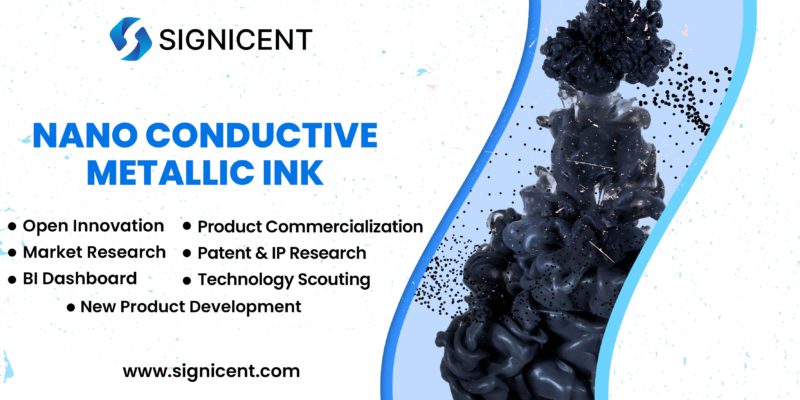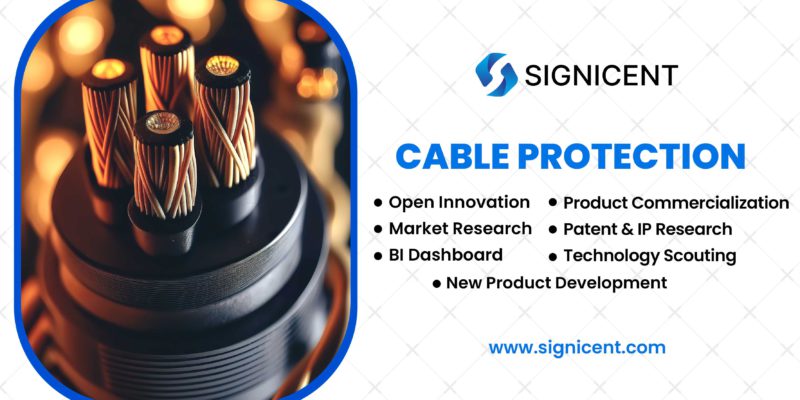Objective
The purpose of this study is to explore and assess the novel applications of nano conductive metallic inks in modern electronics, investigating their potential to enhance miniaturization, flexibility, and conductivity in electronic components.
The study also encompasses comprehensive research on technological breakthroughs, while analyzing competitor activities and strategies within the domain.
Furthermore, the study entails a thorough global market analysis, covering diverse segments and sub-segments like various technologies, regions, and application areas.
Challenge
Navigating the challenge involves a delicate balance between harnessing the benefits of silver nanoparticles and managing production costs and efficiency. The technology landscape here highlights the need for innovative solutions that can safeguard the integrity of silver nanoparticles during the production process. Novel materials or protective coatings might hold the key to preventing oxidation, ensuring that the remarkable potential of silver nanoparticles in the realm of printed electronics can be fully harnessed without sacrificing cost-effectiveness and process efficiency.
The utilization of specialized equipment in the production of printed electronics using silver nanoparticles-based inks can result in elevated manufacturing expenses.
However, a significant challenge associated with this approach is the susceptibility of silver nanoparticles to oxidation, which subsequently gives rise to the development of metal oxide compounds. This undesirable metal oxide formation detrimentally impacts the efficiency of the production process.
The oxidation-driven transformation alters the properties of the nanoparticles, leading to compromised conductivity and functionality of the printed electronics. This hurdle necessitates the implementation of effective strategies to mitigate oxidation-induced hindrances, ensuring that the potential benefits of silver nanoparticles in printed electronics are fully realized while maintaining optimal production costs and process efficiency.
Innovations
Ink Formulation: Copprint addresses the aforementioned problem by developing a unique conductive ink formulation based on copper nanoparticles. This formulation utilizes copper nanoparticles along with copper oxidant and copper hydride (CuH).
Role of CuH: Copper hydride (CuH) serves as a protective agent for the copper nanoparticles. Its primary function is to prevent the oxidation of copper nanoparticles, ensuring their long-term stability and conductivity.
Maintaining Equilibrium: To maintain a continuous equilibrium between the copper nanoparticles and CuH, a copper oxidant is employed. This copper oxidant helps in regulating the balance between the two components.
Oxidation and H2 Formation: When CuH particles are exposed to oxidation, they produce hydrogen gas (H2) as a byproduct. This hydrogen gas acts as a barrier that impedes the formation of copper oxide on the surface of the nanoparticles.
Sintering through Metal-Metal Interaction: Sintering is a process where particles fuse together to form a solid mass. In the case of Copprint’s conductive ink, the copper nanoparticles undergo sintering facilitated by metal-metal interactions. The protective H2 barrier created by the oxidation of CuH allows the copper nanoparticles to come into close contact and interact, promoting effective sintering.
In essence, Copprint’s approach, enriched by technology scouting, involves using copper nanoparticles in their conductive ink formulation, along with a combination of copper oxidant and copper hydride (CuH) discovered through technology scouting. The CuH, identified through technology scouting, acts as a protective agent to prevent oxidation of copper nanoparticles. The oxidation of CuH, unveiled through technology scouting, leads to the formation of a hydrogen gas barrier, which in turn facilitates sintering of the copper nanoparticles through metal-metal interactions. This innovative formulation, rooted in technology scouting, helps maintain conductivity and performance over time by mitigating the negative effects of copper oxidation.
Each year Signicent provides consultancy to hundreds of organizations to help transform their innovations to value.
Market insights
Signicent Market intelligence have found, the capabilities of PFNano, Novacentrix, and Nanodimension’s manufacturers can navigate complex hurdles like oxidation-induced compromises in conductivity and functionality. These companies’ products offer strategic interventions that mitigate the impact of oxidation on the performance of silver nanoparticles-based inks.
PFNano, a South Korean company, is making waves by offering inks at a fraction of competitors’ prices. They’re developing copper and silver-based nano inks, aiming for affordability without compromise.
Over in Texas, Novacentrix is a powerhouse in high-performance solutions. Their specialty lies in conductive inks, boasting an extensive lineup that underscores their dedication to innovation.
Meanwhile, Nanodimension, based in Israel, takes additive manufacturing to the next level. Their DragonflyTM system can simultaneously print conductive and dielectric inks. This advancement not only paves the way for Additively Manufactured Electronics (AME) but also opens doors to high-performance electronic devices.
Together, these companies are rewriting the rules of printed electronics. From disruptive pricing to high-performance solutions and groundbreaking manufacturing techniques, their contributions are shaping an exciting and accessible future for electronics.
Market research
In 2020, the Printed and Flexible Electronics industry yielded around $57 Bn in revenue. There are two crucial aspects that define this market. Firstly, it is estimated that the industry’s revenue will experience a steady growth rate of 11.1% until 2025. Secondly, a notable characteristic is that the investment in conductive materials within this sector surpasses 5% of the total revenue.
Key players
The market is dominated by the following key players at the forefront : Du Pont, ANI , InkTec and C-Ink.



